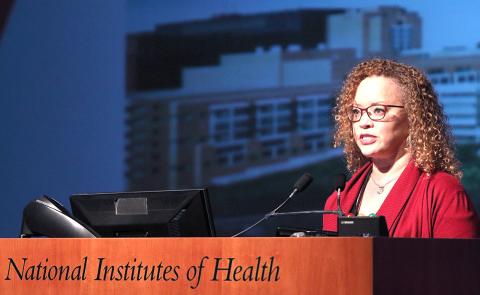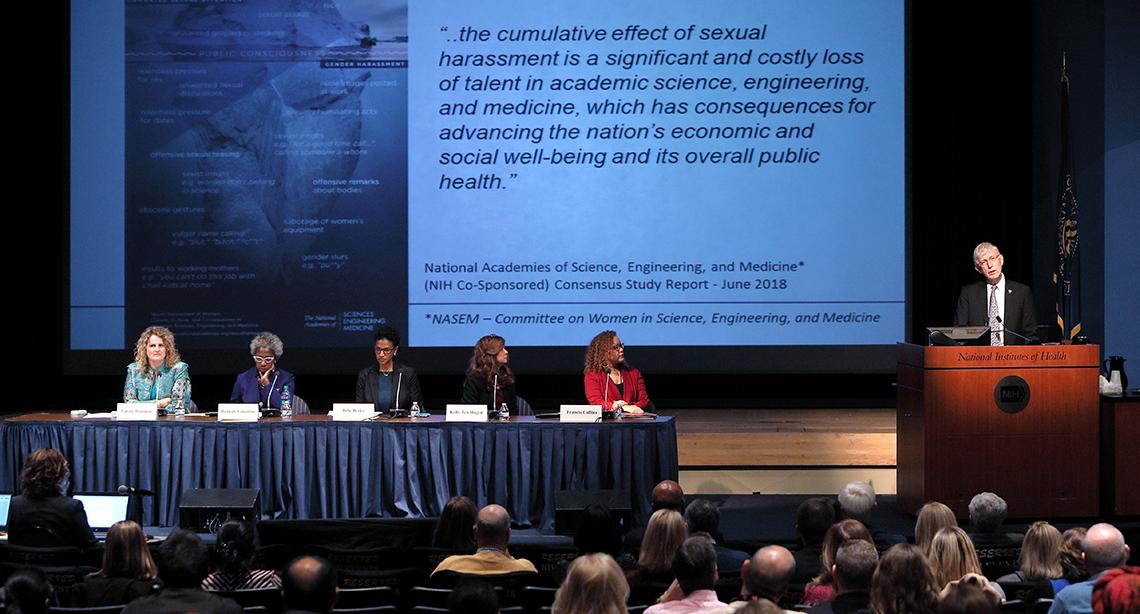NIH Launches Survey to Gauge Workplace Climate, Harassment

Photo: Chia-Chi Charlie Chang
Workplace climate affects how people feel immediately when walking into their work locations. Here at NIH, that might be an office, a lab, a cafeteria, a mail room or the many other spaces in which NIH staff work. On average, people spend about a third of their life at work, so workplace climate matters: it’s the atmosphere in which we interact with all kinds of people—solving problems and providing solutions, designing and conducting experiments and creating and sustaining collaborations of all types.
Right now, NIH is in the process of finding out firsthand what staff—including employees, contractors, fellows, trainees and special volunteers—think and how they feel about their work environments. The inaugural NIH Workplace Climate and Harassment Survey, launched Jan. 28, is a concerted effort to measure the climate in dozens of workplaces at NIH in Bethesda and also at the agency’s properties across the nation.
Important Points About the Survey
- It is confidential and anonymous.
- You can take it at your convenience on your mobile device or computer.
- You can save your responses and return to it later, but it’s important that you click “submit” to register your responses.
- You can skip any questions you don’t feel comfortable answering.
- We need a strong response rate to understand how we can address harassment and improve the NIH workplace climate.
- The survey runs from Jan. 28 to Mar. 25.
You can access the survey through a personalized link embedded in an email you received from the Science and Technology Policy Institute, an independent contractor administering the survey.
The survey, aimed at measuring the effects of workplace climate on NIH staff, is a vital part of the NIH Anti-Harassment Program, which was addressed at an agency-wide town hall meeting in December 2018. The survey’s results will help shape efforts to create a workplace climate that is conducive to the highest quality work and one in which uncivil behavior of any kind is unwelcome and not tolerated. Because workplace climate is known to have consequences on people’s attitudes toward their work and affects their health, the survey goes beyond harassment and asks questions about job satisfaction, career choices and general wellness based on the overall climate of the workplace.

Photo: Chia-Chi Charlie Chang
“Looking closely at our own atmosphere is a crucial step in understanding the role of harassment in job satisfaction, performance and the ability to live the NIH mission every day,” said NIH director Dr. Francis Collins. “At the most fundamental level, our mission is about the respect of human life, which should permeate all aspects of our lives and work.”
The NIH Workplace Climate and Harassment Survey isn’t just for scientists, nor is it only for women. Dr. Hannah Valantine, NIH’s chief officer for scientific workforce diversity and a physician-scientist in the NHLBI intramural research program, and her team developed the survey with national experts in survey design. She explains that the survey looks more broadly at all inappropriate and disruptive behaviors, including other types of harassment and bullying. For this reason, it’s important for all NIH staff to take the survey.
“We need to hear from everyone at NIH about their workplace experiences, good or bad,” said Valantine. “Only then can we figure out how to address any problems identified with targeted solutions.” She added that the survey is not a reporting tool—anyone who has experienced harassment should report it via the NIH Civil program.
Understanding workplace environment is key to preventing and addressing harassment. According to a June 2018 report from the National Academies of Science and Engineering, organizations that are tolerant of harassment—or that are perceived to be tolerant of harassment—show higher rates of sexual harassment than those seen as intolerant. To achieve its goal of measuring the NIH climate—and as with any survey—the more data the better.
The survey will close Mar. 25, so if you haven’t taken it already, take it today. If you’ve started the survey but not completed it, finish it today.
